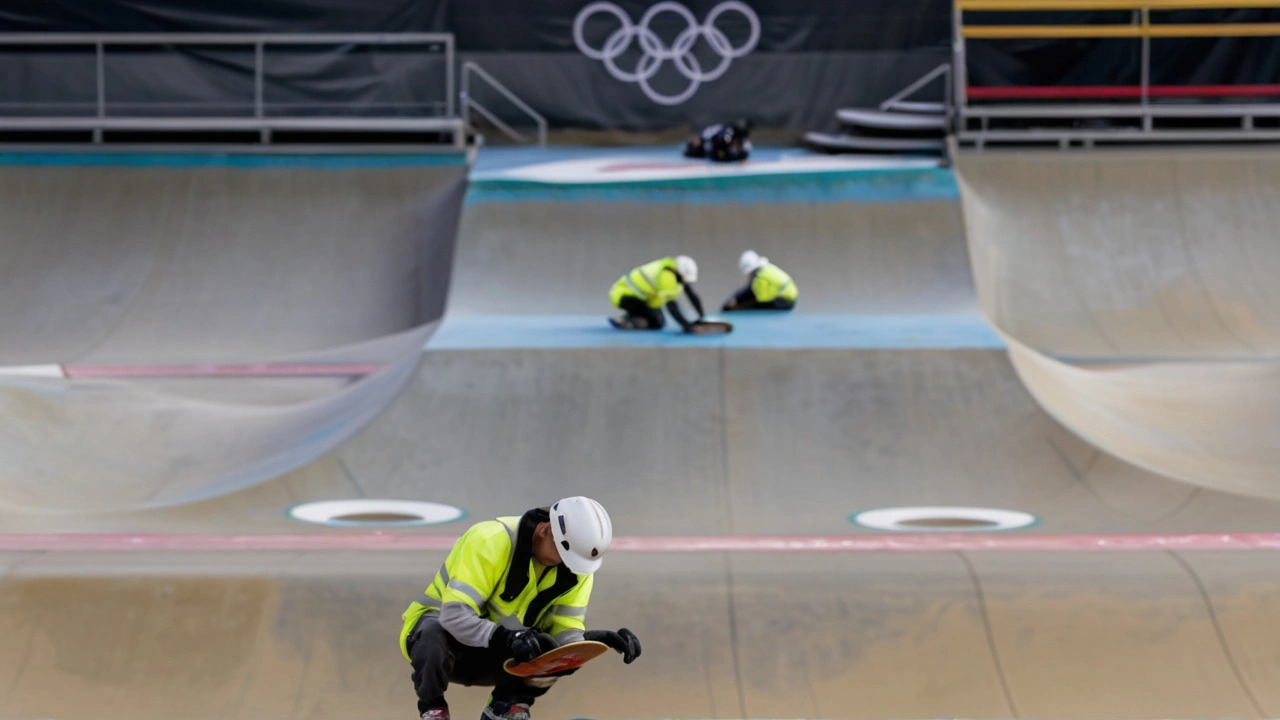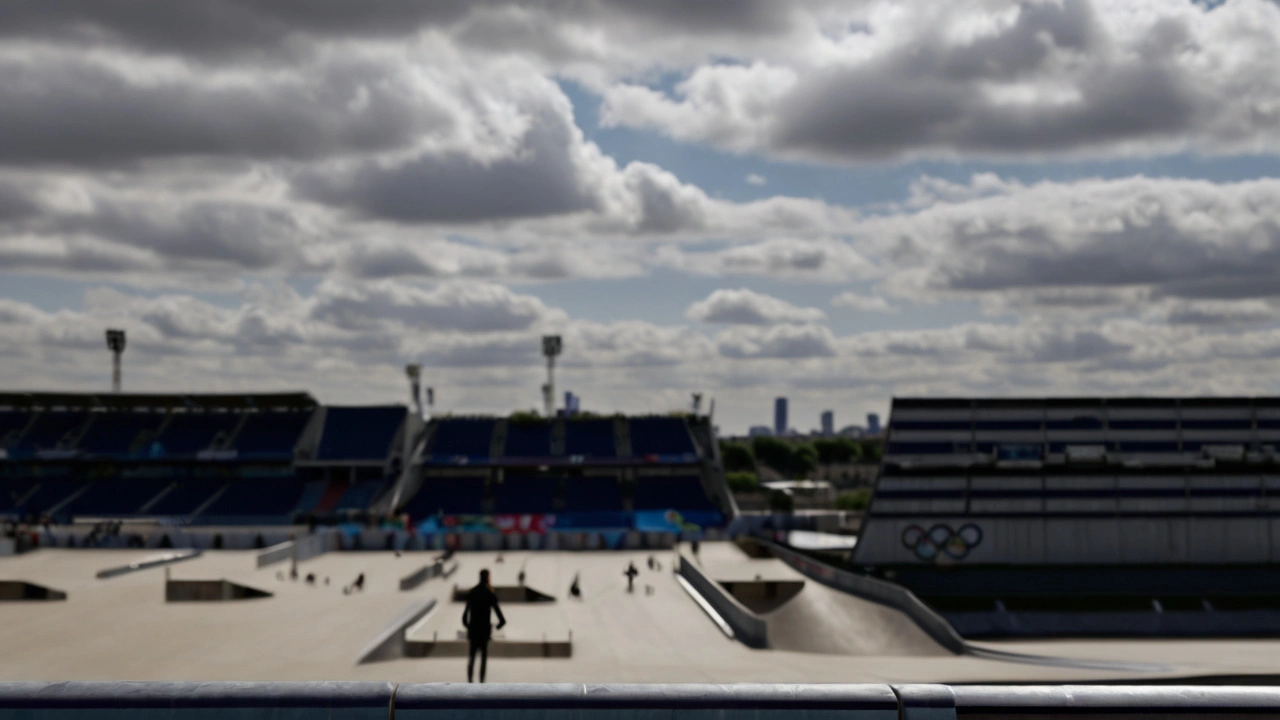Rain Delays Men’s Street Skateboarding Event at 2024 Paris Olympics

Rain Forces Postponement of Men’s Street Skateboarding Event at Paris Olympics
Overnight rain led to a significant disruption at the 2024 Paris Olympics, as the men’s street skateboarding event originally scheduled for Saturday had to be postponed to Monday. This unforeseen change underscores the delicate relationship between outdoor sports and weather conditions, bringing to light the unpredictable nature of such events.
Impact on Athletes and Organizers
For the skateboarders who were eagerly anticipating their Olympic debut, this delay represents a mixed bag of emotions. Many spent months, if not years, training for this specific moment, carefully timing their preparations to peak right at the start of the competition. A change in schedule, especially one as close as this, can throw off an athlete’s mental and physical readiness.
The organizers have their hands full as well. They must ensure the new schedule fits into the overall Olympic timeline without causing too many conflicts or overlaps with other events. Such adjustments demand meticulous planning and seamless communication among athletes, trainers, and other stakeholders.
The Women's Event
Fortunately, the women’s street skateboarding event has not been affected by the rain. Scheduled for Sunday, the event will go ahead as planned, pending any further weather changes. This decision offers relief and a sense of normalcy in an otherwise chaotic scenario.
Nevertheless, this mix-up highlights the inherent volatility of scheduling outdoor events. While sport is often seen as a spectacle of human achievement and physical prowess, it is also a battle against the elements.
Weather Woes in Sporting Events
This is not the first time weather has thrown a wrench into Olympic plans. Historically, many outdoor sports have faced postponements or cancellations due to inclement weather. Whether it’s heavy rain, strong winds, or extreme temperatures, the open nature of these events leaves them exposed to the whims of nature.
For example, the 2016 Rio Olympics saw several rowing events postponed due to strong winds, and the 2008 Beijing Olympics had to reschedule numerous events because of heavy rains and fog. Each instance serves as a reminder that no matter how much planning goes into these international sporting events, nature remains an uncontrollable variable.

Preparing for the Unexpected
The local organizing committee, in tandem with international sports governing bodies, now has the task of preparing contingency plans for other outdoor events scheduled over the next few weeks. Flexibility and rapid response will be crucial in mitigating further disruptions, and teams are likely already working round-the-clock to explore all possible scenarios.
In this high-stakes environment, communication is key. Athletes need to stay informed about the latest updates while maintaining their training routines. Trainers and coaches must keep their athletes poised and ready, regardless of sudden changes, to ensure peak performance.
The Bigger Picture
Beyond the immediate logistics, these disruptions also have a ripple effect on television schedules, ticket holders, and even local businesses. Broadcast networks that have purchased rights to air the events may need to jostle time slots, while ticket holders will have to rearrange their plans to accommodate the new dates. Local businesses dependent on the footfall from these events may also experience fluctuations in patronage.
Conclusion
In summary, the postponement of the men's street skateboarding event at the 2024 Paris Olympics serves as a timely reminder of the influence that weather can wield over outdoor events. While such disruptions are inevitable, the way organizers, athletes, and spectators adapt to these changes is a testament to the resilience and flexibility of the Olympic spirit. As the Paris Olympics unfold, all eyes will be on how these adjustments play out, both on and off the sporting arena.
Rain may delay the competition, but the athletes’ dedication remains unshaken.
Honestly, this whole rain fiasco is just another reminder that nature loves to mess with our perfect plans. The skaters trained for months, and now they have to chill while the sky pours. It’s kinda tragic, but also kinda poetic, ya know? They’ll probably come back swinging on Monday, but the vibe is already shifted. I’m not one for drama, but the whole schedule shuffle is a bit of a buzzkill. Still, the women’s event stays on track, so at least there’s a silver lining. People will be talking about this for weeks, I bet. All that’s left is hoping the weather finally decides to cooperate.
It’s great to see the organizers adapting so quickly. The athletes can use this extra time to stay loose and keep their focus sharp. A little rain won’t dampen the spirit of the sport. Everyone’s got a chance to come back refreshed on Monday.
Rain is merely a mirror reflecting our expectations; when the sky weeps, we learn what truly matters. Timing is an illusion and the board is the only constant. The postponement shows that control is a myth.
What the media won’t tell you is that this rain isn’t natural. It’s a calculated maneuver by the shadow elites to manipulate viewership numbers. They’re pushing the event to a prime‑time slot to squeeze more ad revenue while pretending it’s weather‑related. The same people who rigged the 2020 “heat wave” are behind this. You can’t trust the official statements – they’re part of a larger agenda to keep us distracted. Stay vigilant and question every broadcast.
Well, if we’re gonna blame the clouds, why not blame the whole system? Weather delays are just an excuse for the organizers to reshuffle the program to suit sponsors. It’s all a spectacle, and the athletes are the pawns. No one told us the board could be any different. In the end it’s all the same show.
From a philosophical standpoint, the postponement underscores the impermanence of all plans. It reminds us that we must remain adaptable, like water finding its path. The skaters who accept this fluidity will likely perform with greater presence on Monday.
It’s important for fans to understand that the athletes have been prepping for years, so a short delay shouldn’t affect their peak performance. The organizers did the right thing by putting safety first.
Coaches will keep the energy up keep the routines tight and the morale high It’s all about staying ready for when the board calls No panic just focus
Let’s look at both sides – the rain is a legit issue, but the quick reschedule also shows the system’s flexibility. Athletes get a breather and fans get a fresh night of competition. It’s a win‑win if handled well.
Do you really think this is just about puddles? The weather satellites have been acting weird for weeks. Some say it’s a test of our collective resilience, others whisper about hidden climate engineering. Whatever the truth, the drama adds a layer of suspense that keeps the masses glued to the screens.
From an elite perspective, the logistical gymnastics required to reshuffle an Olympic schedule are commendable. It reflects a high‑level operational cadence that many federations aspire to emulate. The athletes will benefit from the precision of this execution.
Correction: the article states "the men’s street skateboarding event originally scheduled for Saturday had to be postponed to Monday." It should read "was postponed to Monday" for proper tense agreement.
The postponement of the men’s street skateboarding event is a fascinating case study in the intersection of sport, weather, and global media narratives. Firstly, one must consider the athletes’ preparation cycles, which are meticulously timed to peak at the moment of competition. When a sudden meteorological event intervenes, it forces a recalibration not just of physical readiness, but of mental focus as well. In addition, the logistical ripple effect touches broadcasters, ticket holders, and local vendors who all depend on precise scheduling. Moreover, the decision to keep the women’s event on track illustrates a nuanced risk assessment by the organizers. It suggests that the specific venue conditions for the women's competition remain within acceptable safety thresholds. The historical context further enriches the discussion, recalling how Rio 2016 and Beijing 2008 faced similar weather disruptions. These precedents highlight a persistent vulnerability in outdoor Olympic programming. The rapid response from the Paris committee also underscores the importance of contingency planning in large‑scale events. Their ability to mobilize resources and communicate changes efficiently reflects robust operational protocols. From a psychological standpoint, athletes often speak of “finding the zone,” a state that can be upset by schedule shifts, yet also can be reinforced through adaptive resilience. Lastly, the broader cultural impact cannot be ignored; fans worldwide adjust travel plans, and social media buzz amplifies the narrative. In sum, the rain delay serves as a microcosm of the delicate balance between human ambition and the impartial forces of nature.
Analyzing the operational impact, the postponement triggers a cascade of re‑allocation of broadcast slots, which can be quantified by a simple Gantt‑chart overlay. From a risk‑management perspective, the contingency buffer built into the schedule was effectively utilized, demonstrating best‑practice adherence. Athletes’ performance metrics may show negligible variance if the additional rest aligns with their periodization plan, but that needs empirical validation. Overall, the situation presents a textbook example of agile event management.
The delay is a straightforward scheduling adjustment caused by rain. No further speculation needed.